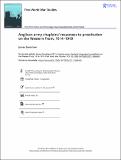Files in this item
Anglican army chaplains' responses to prostitution on the Western Front, 1914–1919
Item metadata
| dc.contributor.author | Earnshaw, James Thomas | |
| dc.date.accessioned | 2021-08-30T10:30:08Z | |
| dc.date.available | 2021-08-30T10:30:08Z | |
| dc.date.issued | 2021-08-19 | |
| dc.identifier | 275433161 | |
| dc.identifier | 9ab8e7c1-b824-4c07-b78a-2167ac111a7b | |
| dc.identifier | 85113721690 | |
| dc.identifier.citation | Earnshaw , J T 2021 , ' Anglican army chaplains' responses to prostitution on the Western Front, 1914–1919 ' , First World War Studies , vol. Latest Articles . https://doi.org/10.1080/19475020.2021.1968469 | en |
| dc.identifier.issn | 1947-5020 | |
| dc.identifier.other | ORCID: /0000-0002-4655-6413/work/99116230 | |
| dc.identifier.uri | https://hdl.handle.net/10023/23862 | |
| dc.description.abstract | Anglican Army chaplains’ responses to prostitution in the First World War remain a neglected subject. Typically, historians have used references to prostitution in chaplains’ diaries and memoirs as anecdotes to illustrate moral tensions with military authorities. However, this approach implies a consistent moral condemnation throughout the conflict, contradicting recent research which emphasizes that chaplains adapted to their military environment and changed their perspectives. This article moves beyond the prevailing use of isolated anecdotes by situating chaplains’ responses to prostitution within military and social contexts. Rather than a static moralist position, it argues that chaplains’ responses to prostitution shifted throughout the conflict. While early responses were characterized largely by interventionist moral objections, from 1915 onwards these moral objections were accompanied by pragmatic assessments and criticisms of regulated prostitution. By adopting a chronological approach, and contrasting civilian and military chaplains approaches to the subject, this study argues that chaplains’ responses to regulated prostitution provide another means of showing how the military environment affected chaplains’ moral stances. | |
| dc.format.extent | 21 | |
| dc.format.extent | 1802314 | |
| dc.language.iso | eng | |
| dc.relation.ispartof | First World War Studies | en |
| dc.subject | Chaplains | en |
| dc.subject | Regulated prostitution | en |
| dc.subject | Bishop Llewelyn Gwynne | en |
| dc.subject | Veneral disease | en |
| dc.subject | Department of Army Chaplains | en |
| dc.subject | D501 World War I | en |
| dc.subject | T-NDAS | en |
| dc.subject | SDG 16 - Peace, Justice and Strong Institutions | en |
| dc.subject | NIS | en |
| dc.subject.lcc | D501 | en |
| dc.title | Anglican army chaplains' responses to prostitution on the Western Front, 1914–1919 | en |
| dc.type | Journal article | en |
| dc.contributor.institution | University of St Andrews. School of History | en |
| dc.identifier.doi | 10.1080/19475020.2021.1968469 | |
| dc.description.status | Peer reviewed | en |
This item appears in the following Collection(s)
Items in the St Andrews Research Repository are protected by copyright, with all rights reserved, unless otherwise indicated.

